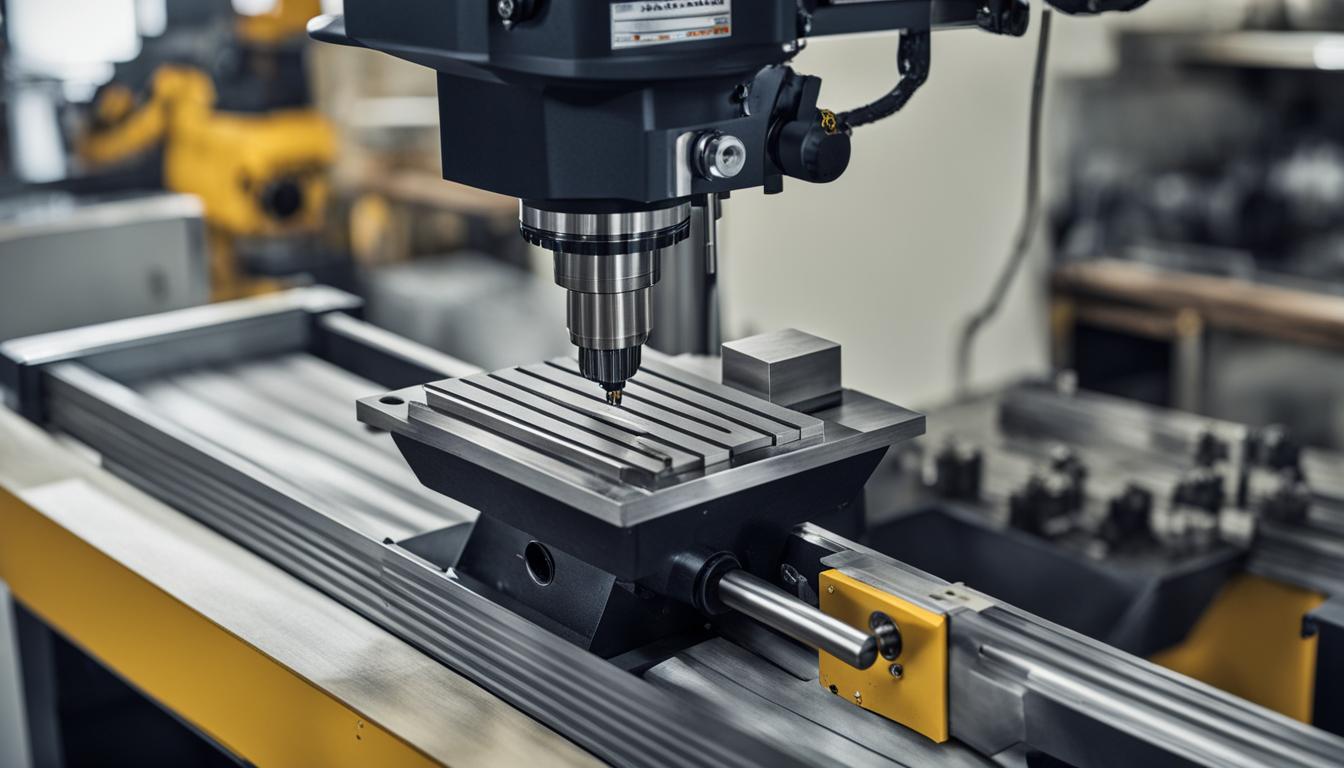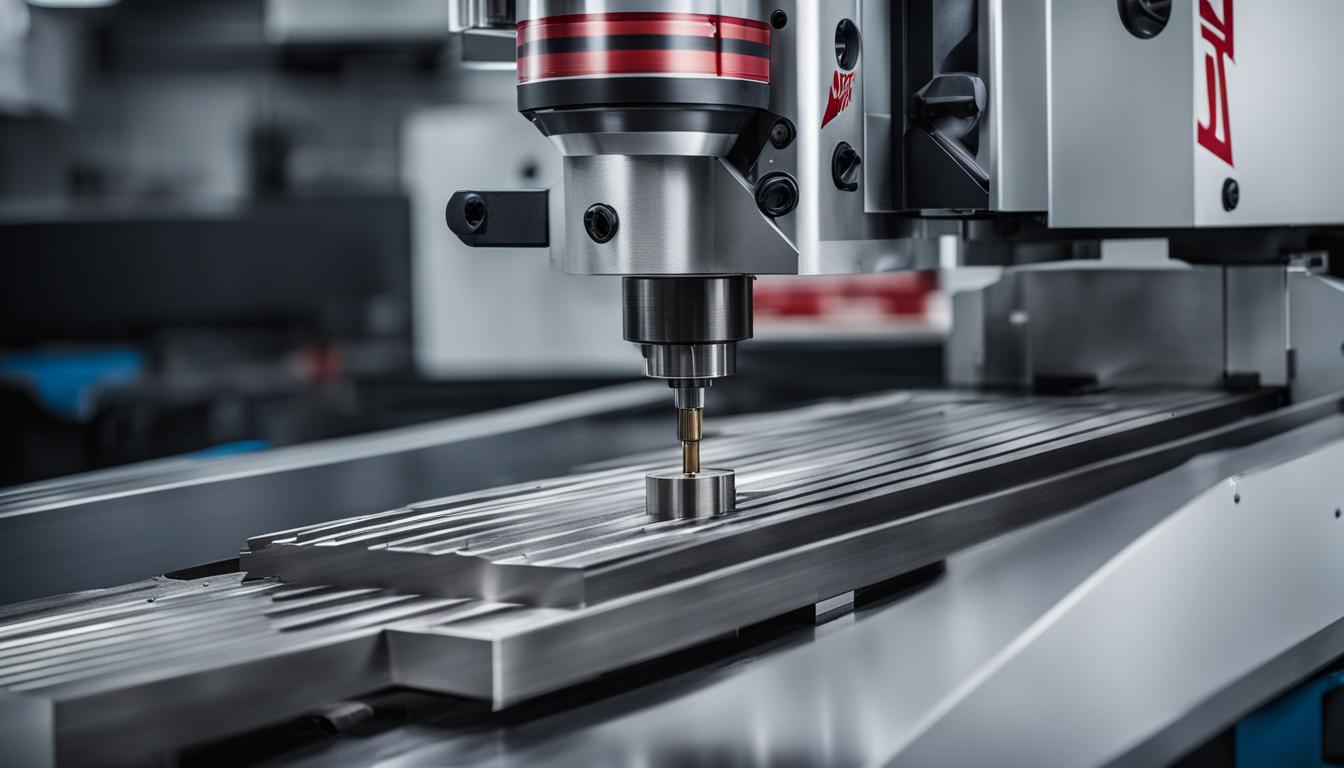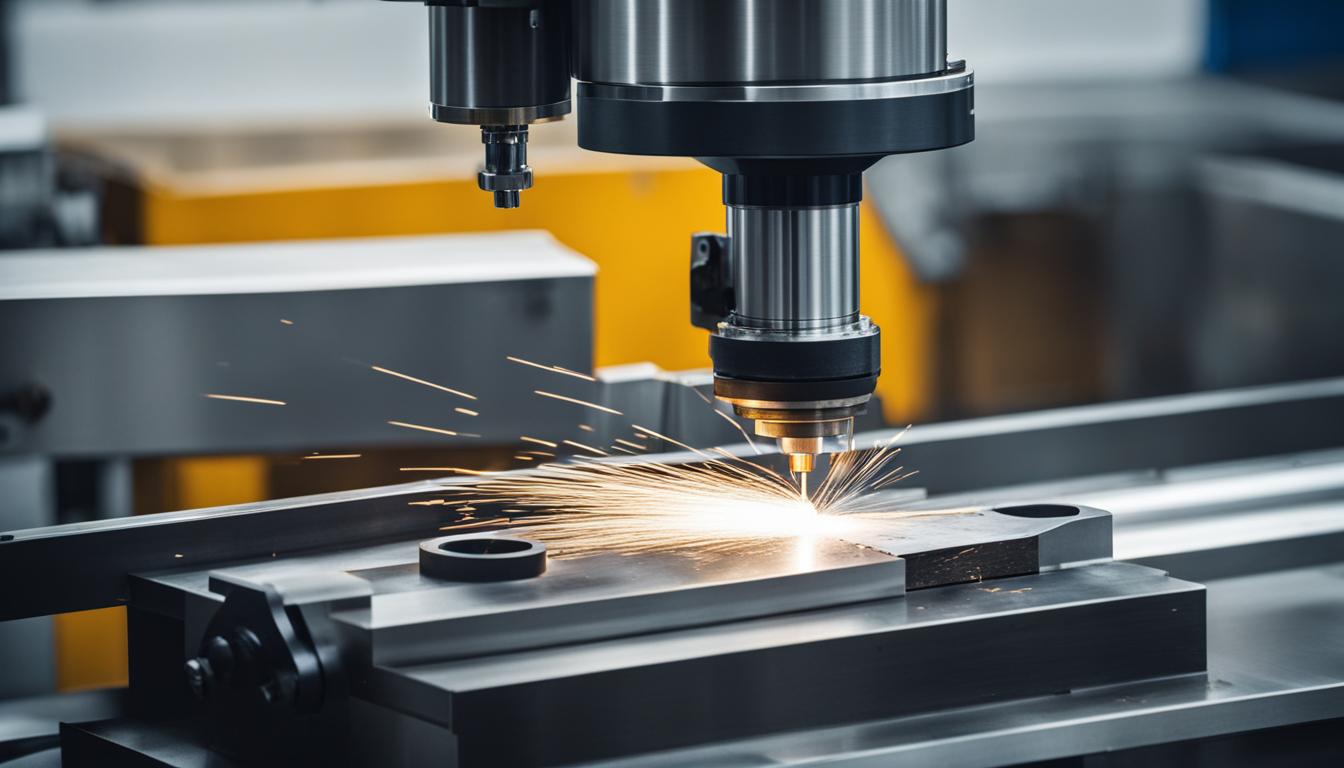The Haas Mini Mill is a compact CNC vertical machining center designed for small-scale production, prototyping, and educational purposes. With travel dimensions of 406 x 356 x 381 mm, it offers a versatile solution for machining small to medium-sized parts. This entry-level CNC machine is ideal for businesses looking to transition into CNC manufacturing or for those requiring a space-efficient solution for light to medium-duty machining tasks.
The Mini Mill comes equipped with a 40-taper spindle, providing the power and precision needed for a wide range of materials and applications. Its compact footprint makes it suitable for shops with limited floor space, while still delivering the reliability and performance associated with larger Haas machines. The Mini Mill series includes variations like the Mini Mill 2, which offers enhanced capabilities for more demanding machining operations.
Priced competitively, with models starting at around $39,995, the Haas Mini Mill presents an accessible entry point into CNC machining technology for small businesses, educational institutions, and hobbyists alike. Its user-friendly interface and compatibility with standard G-code programming make it an excellent choice for both beginners and experienced machinists looking for a reliable, compact CNC solution.
- The Haas Mini Mill is a compact CNC machine designed for precision and efficiency in machining tasks.
- It is ideal for high-production shops with limited space.
- The Mini Mill features all-new FEA-optimized base and column castings, larger travels, and faster spindle speeds and rapids for increased production output.
- It has an all-new Y-axis washdown nozzle to improve chip flow and a 45-gallon external coolant tank for simplified maintenance.
- The Mini Mill can easily interface with Haas robot packages or the Compact APL for fast, easy automation.
- It is available in 40 Taper, 3 Axis, and options for 8k RPM spindle and 10 or 20 tool capacity.
Haas Mini Mill Specifications and Price
The Haas Mini Mill is a compact CNC machine designed for precision and efficiency in machining tasks. It has a maximum cut capacity of 16″ x 14″ x 15″ and a bar capacity of 45 mm. The Mini Mill features a 6.5″ chuck and a 6,000 RPM spindle with 15 hp, offering the power and speed necessary for a wide range of applications.
Here are the specifications of the Haas Mini Mill:
| Specification | Value |
|---|---|
| Cut Capacity | 16″ x 14″ x 15″ |
| Bar Capacity | 45 mm |
| Chuck Size | 6.5″ |
| Spindle Speed | 6,000 RPM |
| Spindle Power | 15 hp |
The Haas Mini Mill is priced at USD prices and serves as an affordable option for businesses and shops with limited budgets. Please note that the listed prices do not include customs duty, customs fees, insurance, VAT, or freight.
Haas Mini Mill Features and Capacity
The Haas Mini Mill is equipped with several features that enhance its performance and increase production output. With its compact design and advanced capabilities, it is a versatile machine suitable for a variety of machining tasks.
Enhanced Stability and Rigidity
The Haas Mini Mill features all-new FEA-optimized base and column castings, resulting in improved stability and rigidity. This ensures precise and accurate cuts, even when working with complex geometries or demanding materials.
Larger Travels and Faster Spindle Speeds
Compared to its predecessors, the Mini Mill offers larger travels, allowing for a greater range of motion and flexibility in machining operations. Additionally, it boasts faster spindle speeds and rapids, reducing cycle times and increasing overall productivity.
All-New Y-Axis Washdown Nozzle
The Mini Mill is equipped with an all-new Y-axis washdown nozzle, designed to enhance chip flow and improve cutting efficiency. This feature ensures that chips and debris are effectively removed from the workpiece, resulting in cleaner cuts and reduced maintenance requirements.
45-Gallon External Coolant Tank
Simplifying maintenance procedures, the Haas Mini Mill incorporates a 45-gallon external coolant tank. This feature provides ample coolant capacity, enabling uninterrupted machining operations and reducing downtime due to coolant changes.
With its robust features and design, the Haas Mini Mill offers a maximum cut capacity of 16″ x 14″ x 15″ and a bar capacity of 45 mm. This enables precision machining of a wide range of parts and materials, making it suitable for various industries and applications.
Take a closer look at the Haas Mini Mill’s features and capacity:
| Cut Capacity | Bar Capacity |
|---|---|
| 16″ x 14″ x 15″ | 45 mm |

The Haas Mini Mill’s features and capacity make it a reliable and efficient CNC machine for various machining tasks. Its enhanced stability, larger travels, and faster spindle speeds contribute to improved performance and increased productivity. With its precision and versatility, the Mini Mill is a valuable addition to any production facility.
Haas Mini Mill vs Other Mills
The Haas Mini Mill offers a compact and cost-effective solution for machining tasks, making it a popular choice among manufacturers. When comparing the Haas Mini Mill to larger mills, several key factors set it apart.
Size and Space Efficiency
The Haas Mini Mill is designed to take up less shop floor space while still providing a generous work envelope. Its compact size allows for efficient use of space, making it ideal for shops with limited room. The smaller footprint of the Mini Mill does not compromise its capabilities, as it still offers a sufficient work area for various machining tasks.
Versatility and Efficiency
The Haas Mini Mill is suitable for handling small parts and is capable of cutting both aluminum and steel. With its fast spindle speeds and low-end torque, the Mini Mill offers versatility and efficiency in a compact package. It allows for precise and accurate cuts, making it a valuable tool for manufacturers seeking high-quality results.
Price and Cost-Effectiveness
In addition to its compact size and versatility, the Haas Mini Mill is also known for its affordability. Compared to larger mills, the Mini Mill offers a cost-effective solution for manufacturers who require efficient machining capabilities without breaking the bank. The lower price point of the Mini Mill makes it an attractive option for small businesses, startups, and budget-conscious manufacturers.
Enhanced Features and Technology
While the Haas Mini Mill may be smaller in size, it does not compromise on features and technology. It is equipped with all-new FEA-optimized base and column castings for improved stability and rigidity. The Mini Mill also features larger travels, faster spindle speeds, and rapids, enhancing its production output. These advanced features ensure that the Mini Mill maintains high levels of performance and precision.
When comparing the Haas Mini Mill to other mills, its compact size, versatility, affordability, and advanced features make it a strong competitor. The Mini Mill offers a superior balance of performance, efficiency, and cost-effectiveness, making it an excellent choice for manufacturers looking to optimize their machining operations.
Haas Mini Mill Applications
The Haas Mini Mill is a versatile CNC machine that finds applications in various industries. Its compact size and high-performance capabilities make it a popular choice for businesses with limited space and a need for precision machining. Here are some of the applications where the Haas Mini Mill excels:
- High-precision Industries: The Mini Mill is commonly used for tool and die work, mold making, and other industries that require intricate and precise machining. Its advanced features and capabilities ensure accurate results, making it ideal for delicate and detailed work.
- Finishing Work: The Haas Mini Mill is well-suited for finishing work due to its precise control and high-speed spindle. It can achieve smooth finishes on various materials, enhancing the final appearance of the machined parts.
- Small Part Machining: With its compact size and precision, the Mini Mill is specifically designed for machining small parts. It offers exceptional accuracy and repeatability, making it perfect for industries that deal with intricate components.
The Haas Mini Mill can be tailored to specific application requirements through optional bolt-on features. This flexibility allows businesses to optimize the machine’s performance and adapt it to their unique manufacturing needs.

Haas Mini Mill for Sale
The Haas Mini Mill is a sought-after CNC machine available for purchase from authorized distributors and dealers of Haas CNC machines. Whether you’re a new business, a school, or an existing shop looking to upgrade your equipment, the Mini Mill offers a compact and cost-effective solution to boost productivity.
To inquire about the availability and pricing of the Haas Mini Mill, customers can contact their local distributors or visit the Haas website. The Mini Mill is designed to provide precision and efficiency in machining tasks while taking up limited shop floor space. Its versatility makes it a popular choice for various industries, including high-production shops with space constraints.
With the Mini Mill, you can experience the power of Haas CNC technology in a smaller package. Take advantage of its fast spindle speeds, low-end torque, and generous work envelope to handle both aluminum and steel machining tasks.
Free up existing equipment and enhance your productivity with the Haas Mini Mill. Contact your local distributor today to explore the available options and discuss pricing.
Haas Mini Mill Pricing:
| Redesigned Mini Mill (Mini CNC Vertical Mill, 40 Taper, 3-Axis, 8k RPM, 10 or 20 Tool Capacity) | $39,995 |
| Redesigned Super Mini Mill (Super-Speed Mini Vertical Mill, 40 Taper, 3-Axis, 10k RPM, 30+1 Tool Capacity) | $46,995 |
| Redesigned Mini Mill-EDU (Mini CNC Vertical Mill Exclusively for Education, 40 Taper, 3-Axis, 8k RPM, 1 Tool Capacity) | $34,995 |
Note: Prices listed above do not include customs duty, customs fees, insurance, VAT, or freight charges.
Haas Mini Mill Review
The Haas Mini Mill has garnered rave reviews from users who have experienced its exceptional performance and reliability. With its compact size and robust construction, the Mini Mill proves to be an excellent choice for CNC machining needs.
One of the standout features of the Haas Mini Mill is its versatility. It has the capability to handle both aluminum and steel materials with ease, making it suitable for a wide range of applications in various industries. Whether it’s machining intricate parts or tackling larger projects, the Mini Mill consistently delivers precise and accurate cuts.
The Mini Mill’s fast spindle speeds and rapid traverse rates significantly contribute to its overall productivity. With increased speeds and efficient movements, users can achieve faster machining times, thereby enhancing their production output. This efficiency makes the Mini Mill an invaluable asset for high-production shops and businesses aiming to optimize their manufacturing processes.
Additionally, users appreciate the user-friendly and intuitive interface of the Haas control system. The Mini Mill’s control panel allows for seamless operation, making it accessible to both experienced machinists and those new to CNC machining. This ease of use eliminates unnecessary complexities and ensures that users can maximize the capabilities of the Mini Mill without any hassle.
The positive feedback from users showcases the Haas Mini Mill’s ability to meet the demands of precision machining tasks. Combining durability, versatility, and user-friendly features, the Mini Mill establishes itself as a reliable and efficient CNC machine. Its exceptional performance and impressive capabilities make it a worthy investment for any shop or business seeking quality and productivity in their machining operations.
Haas Mini Mill Automation and Accessories
The Haas Mini Mill offers a range of options for automation and accessories to further enhance its capabilities and streamline production processes. With the ability to easily interface with Haas robot packages or the Compact APL (Automatic Parts Loader), the Mini Mill enables fast and efficient automation. This means that operators can maximize productivity by minimizing manual intervention and optimizing machine utilization.
Additionally, the Haas Mini Mill can be equipped with various accessories to meet specific manufacturing needs. These accessories include chip-disk filtration, chip conveyors, and coolant modules. The chip-disk filtration system helps to maintain a clean working environment by efficiently removing chips and debris during the machining process. The chip conveyor aids in the efficient removal of waste material from the workspace, enabling uninterrupted production. The coolant module provides a regulated and consistent flow of coolant to ensure optimal cutting performance and prolong tool life.
If you are interested in the Haas Mini Mill automation options or want to explore the range of available accessories, you can reach out to Haas distributors and dealers for more detailed information and pricing. They can guide you through the customization process and recommend the most suitable automation solutions and accessories based on your specific production requirements. By leveraging automation and utilizing the right accessories, you can unlock the full potential of the Haas Mini Mill and optimize your machining operations.
